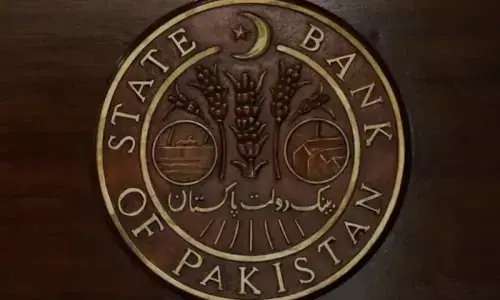THERE seems to be no light at the end of the tunnel as the deadlock between a defiant parliament and a beleaguered chief justice continues to endanger the entire edifice. The confrontation is now coming to a head, with lawmakers refusing to release the funds needed to hold elections in Punjab as directed by the apex court. The ball is back in the chief justice’s court.
It’s a tricky situation for the top judge, who is facing dissension within his own ranks as well as a highly polarised political atmosphere in the country. While the credibility of the top judiciary is at stake, the legislature is also not prepared to give in to what it describes as an ‘imperial’ ruling. The power struggle between the two institutions has exacerbated the political and constitutional crises.
In defiance of court orders, some federal ministers have declared that the Punjab elections won’t be held on May 14. Not only is the administration unwilling to release the requisite amount to the Election Commission of Pakistan, it has also refused to ensure security for the polls, once again going against the Supreme Court’s orders. In the current environment, any contempt action against the civilian leadership will have serious implications for the institution and the state.
It is true that a prime minister lost his job and other senior political leaders faced disqualification on contempt charges in the past, but given the point we have reached today — a constitutional breakdown — contempt action could be perilous. Moreover, how would a divided house enforce its judicial writ?
The legislative powers of parliament cannot be questioned.
Besides the divisions among the judges, the bar, too, has been critical of some of the chief justice’s actions. It is not just about the ruling on the Punjab Assembly poll but also the decision taken by an eight-member bench to block the ‘Supreme Court (Practice and Procedure) Bill, 2023’ passed by parliament. The bill had proposed clipping the powers of the chief justice, which at the moment allow him to unilaterally take suo motu action; it also aimed to make the procedure of the formation of benches more transparent.
The bill was suspended even before it came into effect. Such pre-emptive action is hardly known in our judicial history. The ruling has also been rendered controversial on account of the composition of the bench, which excluded the senior puisne judge and other dissenting judges. Since it was widely perceived that the chief justice was reluctant to form a full court for such a sensitive matter, further questions have surrounded the merit of the decision.
Clearly, the petition filed by a citizen was taken up prematurely. The bill could not have become law until the president gave his approval. True, it would have automatically come into effect in a couple of weeks even without the president’s assent, but the pre-emptive judicial strike is still puzzling, and has only heightened institutional tensions. Parliament rejected the court’s order, describing it as an “aggressive attempt of the Supreme Court of Pakistan to abrogate the unquestioned constitutional authority of parliament to make legislation”. Questions have long been raised by the legal fraternity as well as the judges on the concentration of power in the office of the top judge to take suo motu notice and form benches.
The past, too, has seen indiscriminate resort to suo motu notice, including on matters that come under the executive’s domain. The judiciary’s unnecessary involvement in political issues which needed to be resolved in parliament has made the top court appear controversial to many who now perceive it as being partisan. The most recent example was the suo motu notice taken by the chief justice on the Punjab Assembly and KP Assembly elections. The action has been questioned not only by the government but also by various bar associations.
There may be a difference of view on whether the changes in rules should be carried out through an act of parliament or be left to the apex court to do. But the legislative powers of parliament cannot be questioned. In case there were questions regarding the validity of the proposed bill, the issue should at least have been put before a full bench.
The Pakistan Bar Council has said it would embark on a countrywide movement if the Supreme Court doesn’t recall its decision regarding the bill. Bar councils representatives, including the Supreme Court and high court bar associations, want the apex court to “show restraint rather than becoming part of an accelerating political crisis”, and give time to politicians to resolve matters. Unfortunately, the bar itself seems divided on constitutional issues and is probably affected by the political polarisation.
As the gloves come off, the ruling coalition has launched a concerted campaign against the chief justice saying that he is misusing his judicial authority. A reference has been filed against him and some other judges in the Supreme Judicial Council for judicial “misconduct”.
As things get messier, fears of a complete constitutional breakdown grow stronger. Both sides seem to have hardened their respective positions. Sadly, the clash of institutions has worsened the current impasse, with the ruling and opposition parties picking their ‘favourite’ judges. The perception of the judiciary becoming the part of the ongoing political power game is extremely dangerous for the rule of law and the democratic process in the country.
While the political leadership must refrain from taking their battle for power to the courts and resolve their conflict through negotiations and in parliament, it is also the responsibility of the judiciary to keep itself out of the political fray. The Supreme Court must restore its credibility and end any perceptions of partiality. It is also imperative to carry out the much-needed procedural reforms that are vital to making judicial functions and the delivery of justice more effective.
The writer is an author and journalist.
zhussain100@yahoo.com
Twitter:@hidhussain
Published in Dawn, April 19th, 2023

































